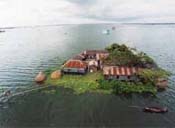OP-ED
Focusing on community strength for disaster preparedness
 We can mobilise all the communities at every corner of Bangladesh and we will discover that they all have the same potentials. They by themselves will find a way out of their problems, writes M Mizanur Rahman.
We can mobilise all the communities at every corner of Bangladesh and we will discover that they all have the same potentials. They by themselves will find a way out of their problems, writes M Mizanur Rahman.
INVESTMENT in disaster preparedness can save five times as much as the money spent. But we do not do this only for the lack of awareness and we do not even explore the potential the people in our community have. We spend a huge amount of money annually for relief and rehabilitation works for the disaster affected people. There are a number of initiatives taken both at the government and the non-government level regarding these issues. It seems that we have taken it for granted that disasters will affect us on a regular basis and we will have to see it as fate and suffer from these. Government and non-government agencies stay ready with some relief so that whenever there is any disaster in an area, they can instantly bring some relief to the victims. But is it all that can be done? Now time has come to think about how much relief can do for the poor people of Bangladesh.
There has been a paradigm shift from relief to disaster preparedness and in this regard, the main responsibility lies with the community people. At the same time, the development agencies, both government and non-government, has a sacred duty i.e. effective community mobilisation. We need to encourage the community to discover their potential so that they can solve their problems by themselves without waiting for any external support.
A few days ago, I had the opportunity to visit a very remote char at Gaibandha. While talking to the community, I observed that there were a number of problems that need immediate solution. Some of the solutions they proposed needed the investment of a good amount of money, but the most important things needed a small amount and I found that even they themselves can manage this. The community identified transportation to be a major problem. These people have been suffering from this problem from the very first day they started living at this char, but could not get a sound solution. If it is solved, they can send their children to the mainland schools. It will be of great help when people become sick and need to see the doctor urgently; especially the pregnant women can be taken to the hospital quickly, which they cannot do now as there is no boat to cross the water around the char.
I got a good opportunity to justify my belief that the poor communities can do a lot, but they have to be talked into it. Within a briefing of ten minutes, the people realised that this is only their problem and there is no one to help in this regard, except for themselves. They agreed to try and solve their problems with sincerity. Only an engine driven boat can be handy in overcoming the transport problem. When they informed me that Tk 40,000 is enough to buy this kind of boats, I wanted to know how many families there were in the char and they replied that there were more than 1,000. When I said them that it is very much possible to solve their problem overnight if all of them cooperate and donate only Tk 40 each, they were astonished to see how easy it is to resolve the problem. The light on their faces told me that they have discovered a thing which will be the agent of enlightenment and safety.
I told them that I will revisit them after a month and I will be eagerly waiting to see that their children are going to the school on the boat and also that I don’t want to find that any pregnant woman has died only for lack of transportation. All the people in that Village Development Committee assured me that within a very short time they will be able to show me proof of their unity.
I have heard that they are working on this by going from door to door and collecting money and rice — whichever the people can give. I firmly believe that they will achieve the target. There are some other initiatives that need to be taken. For example, they dream that a doctor will visit them on a weekly basis, which is also manageable through their own effort.
Two things are important here, firstly, the people have to be aware enough to realise the importance of education and secondly, they should have faith on their potential. These poverty-torn people have been struggling for their livelihood since they were born and did not even find any time to think about their potentials and the best way to utilise their limited resources.
In an article published on New Age a while ago, I expressed that these people live only to eventually die and they have no other aim or option in their life. But now I believe that it can be changed. Our simple assistance can change their philosophy of life; help them think creatively and make their own way of life and dream, like I do, of a change in status, a better livelihood, education, proper and available treatment and ultimately, the life of a human being.
People in this char now dream of a change and they are working sincerely for bringing in the change in their life. We can mobilise all the communities at every corner of Bangladesh and we will discover that they all have the same potentials. They by themselves will find a way out of their problems. What we, the development practitioners, need to do is proper sensitisation and mobilisation. The non government organisations have a wide reach in the country and if they all utilise this methodology, people will be motivated and work for themselves. It is undoubtedly true that the old days are gone and the people do not want relief any more rather they want to do something by their own self, which can of course be our inspiration of work for a better Bangladesh.
(Article originally published on New Age)
M Mizanur Rahman is a programme officer at Islamic Relief Worldwide. mithunmds07@gmail.com

